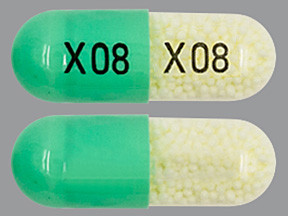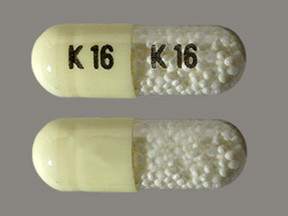INDOMETHACIN SUSTAINED-RELEASE CAPSULE - ORAL
PHONETIC PRONUNCIATION: (in-doh-METH-uh-sin)
COMMON BRAND NAME(S): Indocin SR
GENERIC NAME(S): indomethacin
Uses
USES: Indomethacin is used to relieve pain, swelling, and joint stiffness caused by arthritis, bursitis, and tendonitis. Reducing these symptoms helps you do more of your normal daily activities. The sustained release capsule does not relieve pain quickly. Therefore, do not use it for sudden gout attacks. This medication is known as a nonsteroidal anti-inflammatory drug (NSAID). If you are treating a chronic condition such as arthritis, ask your doctor about non-drug treatments and/or using other medications to treat your pain. See also Warning section.
How to use INDOMETHACIN SUSTAINED-RELEASE CAPSULE - ORAL
HOW TO USE: Read the Medication Guide provided by your pharmacist before you start using indomethacin and each time you get a refill. If you have any questions, ask your doctor or pharmacist. Swallow this medication whole. Do not crush or chew the capsules. Doing so can destroy the long action of the drug and may increase side effects. Take this medication by mouth as directed by your doctor, usually once or twice daily with a full glass of water (8 ounces or 240 milliliters). Do not lie down for at least 10 minutes after taking this drug. Take this medication either with food, right after meals, or with antacids to prevent stomach upset. Dosage is based on your medical condition and response to treatment. Do not take more than 150 milligrams per day. To lessen side effect risks (such as stomach bleeding), use this medication at the lowest effective dose for the shortest possible length of time. Do not increase your dose or take it more often than prescribed. For chronic conditions such as arthritis, continue taking it as directed by your doctor. Discuss the risks and benefits with your doctor or pharmacist. In certain conditions (such as arthritis), it may take up to 4 weeks when this drug is taken regularly before you notice the full benefits. Tell your doctor if your condition worsens.
Side Effects
Precautions
Interactions
Overdose
Images

- color
- green
- shape
- oblong
- imprint
- X08, X08

- color
- yellow
- shape
- oblong
- imprint
- K 16, K 16

- color
- yellow
- shape
- oblong
- imprint
- K 16, K 16

- color
- green
- shape
- oblong
- imprint
- G, G325

- color
- green
- shape
- oblong
- imprint
- G, G325

- color
- green
- shape
- oblong
- imprint
- G, G325
Reviews
Faq for INDOMETHACIN SUSTAINED-RELEASE CAPSULE - ORAL
Indomethacin sustained-release capsule is used to relieve pain, swelling, and stiffness caused by conditions such as arthritis, gout, bursitis, and tendonitis.
Follow the instructions provided by your healthcare professional. Usually, indomethacin sustained-release capsule is taken with food or milk to reduce stomach upset. Swallow the capsule whole, without crushing or chewing it.
The common side effects may include upset stomach, heartburn, dizziness, drowsiness, headache, and swelling. Contact your doctor if any of these side effects persist or worsen.
It is essential to inform your doctor about all the medications you are taking, including prescription, over-the-counter, and herbal products. Some drugs may interact with indomethacin sustained-release capsule, leading to adverse effects.
Indomethacin sustained-release capsule should only be used during pregnancy if clearly needed, as it may harm the unborn baby. Consult your doctor before using this medication if you are pregnant or planning to become pregnant.
Alcohol consumption may increase the risk of stomach bleeding when combined with indomethacin sustained-release capsule. It is advisable to avoid or limit alcohol intake during treatment.
The onset of action may vary depending on the individual and the condition being treated. It is recommended to follow the prescribed dosage and give the medication enough time to show its effects.
If you miss a dose, take it as soon as you remember. However, if it is close to the time for your next dose, skip the missed dose and continue with your regular dosing schedule. Do not double the dose to make up for a missed one.
Indomethacin sustained-release capsule is generally not recommended for use in children. The safety and effectiveness of this medication in pediatric patients have not been established, so consult with a healthcare professional for alternative options.
Warning
WARNING: Nonsteroidal anti-inflammatory drugs (including indomethacin) may rarely increase the risk for a heart attack or stroke. This effect can happen at any time while taking this drug but is more likely if you take it for a long time. The risk may be greater if you have heart disease or increased risk for heart disease (for example, due to smoking, family history of heart disease, or conditions such as high blood pressure or diabetes). Do not take this drug right before or after heart bypass surgery (CABG). Also, this drug may rarely cause serious (rarely fatal) bleeding from the stomach or intestines. This effect can occur without warning symptoms at any time while taking this drug. Older adults may be at higher risk for this effect. (See also Precautions and Drug Interactions sections.) Stop taking indomethacin and get medical help right away if you notice any of the following rare but serious side effects: bloody or black/tarry stools, persistent stomach/abdominal pain, vomit that looks like coffee grounds, chest/jaw/left arm pain, shortness of breath, unusual sweating, weakness on one side of the body, sudden vision changes, slurred speech. Talk with your doctor or pharmacist about the risks and benefits of treatment with this medication.
Disclaimer
IMPORTANT: HOW TO USE THIS INFORMATION: This is a summary and does NOT have all possible information about this product. This information does not assure that this product is safe, effective, or appropriate for you. This information is not individual medical advice and does not substitute for the advice of your health care professional. Always ask your health care professional for complete information about this product and your specific health needs.
No Reviews Yet